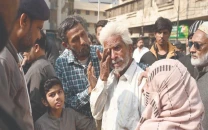Sindh’s children are at risk due to lapse in routine immunisation
Doctors say coverage has suffered due to focus on polio eradication

PHOTO: FILE
He was speaking at an interactive session with the media organised on Wednesday by the International Vaccine Access Centre Johns Hopkins University, United States, in collaboration with Expanded Programme on Immunisation (EPI) Sindh.
He added that routine immunisation coverage has suffered because all the focus has been on the eradication of polio in Sindh. Punjab is doing well and their routine immunisation coverage is now 85% due to their strong reporting mechanism. "When routine immunisation can be improved in Punjab and Khyber-Pakhtunkhwa then why can’t it be improved in Sindh and Balochistan?" he questioned.
Discussing increasing immunisation coverage in Sindh, he said, "If the public demands immunisation for children, the government will be bound to take action." He added that if measles cases are being reported in some areas why are official concerned not being held accountable.
FIRs to be registered against parents refusing immunisation
Pakistan is the largest recipient of the Global Alliance for Vaccination and Immunisation (GAVI). "When international donors give us vaccines they want to see our performance too. If routine immunisation coverage doesn't improve in Sindh they may withdraw funding," he feared.
Earlier, when the routine immunisation coverage rate was high these diseases were in control. After the polio emergency was declared by the government all routine immunisation vaccinators were appointed for polio drives and routine immunisation coverage suffered. People expected vaccinators to visit door-to-door to vaccinate their children, lamented Dr Raza, adding that since the government spends Rs24,000 per child, therefore parents should visit EPI centres to vaccinate their children.
Journalists Huma Khawar and Zofeen T Ebrahim were facilitators at the event. Speaking on the occasion, Khawar said that when it comes to routine immunisation coverage in Sindh accountability and political commitment are the biggest issues in the region.
Dr DS Akram, who is honorary chairperson of the Health Education and Literacy Programme, said malnourished children are more likely to suffer from diseases such as pneumonia, diarrhoea, malaria and measles. "Therefore, there is a need to focus on nutrition. Immunisation is the greatest tool to prevent diseases."
Digital registry brings us a step closer to 100% immunisation in Sindh
She said for a child's brain development and physical health the first two years or 1,000 days are extremely important. She added that malnourished children are more likely to suffer from diahorrea, measles and tuberculosis and these illnesses lead to low immunity.
Dr Akram said to overcome nutrition issues it is very important that the mother is healthy. Breastfeeding is a must and timely completion of routine immunisation is essential too. "The effects of malnutrition will always be a problem for the child for their entire life."
Dr Raza said in Sindh about 48% children are suffering from moderate stunting while 24% are suffering from severe stunting.
EPI Sindh Project Director Dr Agha Ashfaq said these days, cases of measles are on the rise in the province. "There won't be any issue if routine immunisation coverage improves," he said, adding that polio will be eradicated from Pakistan by next year and after two years the country will be given certification.
Anti-measles campaign to start in the city tomorrow
Dr Ashfaq said that they were playing their part in increasing routine immunisation coverage in Sindh. The EPI, in collaboration with the Sindh health department, launched the Zindagi Mehfooz Digital Immunisation Registry in the province. The programme is an android-based application developed by the Interactive Research and Development and Indus Hospital to reduce child mortality with the help of routine immunisation coverage.
Dr Ashfaq claimed that so far, routine immunisation coverage had increased from 35% to 45% due to better monitoring. "We aim to increase immunisation coverage to 80% in the five years.”



















COMMENTS
Comments are moderated and generally will be posted if they are on-topic and not abusive.
For more information, please see our Comments FAQ